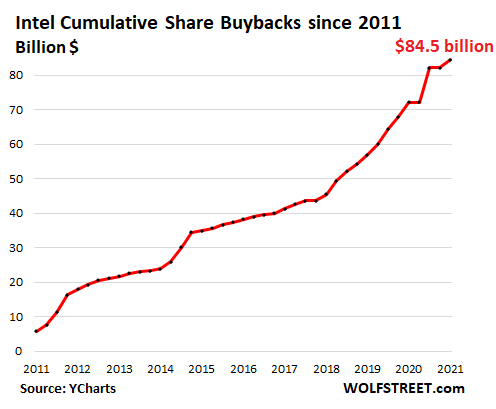Intel & TSMC on Chip Shortage: After Blowing $84 Billion on Share Buybacks since 2011 and Now Woefully Behind, Intel Clamors for $50 Billion in Subsidies for US Chip Industry
by Wolf Richter, Wolf Street:
 “We will not be anywhere near as focused on buybacks going forward as we have in the past”: Intel’s new CEO.
“We will not be anywhere near as focused on buybacks going forward as we have in the past”: Intel’s new CEO.
US semiconductor manufacturing has declined to where it is now only 12% of the world’s total, said Intel’s new CEO Pat Gelsinger in an interview with CBS on 60 Minutes. “And anybody who looks at supply chain says, ‘That’s a problem.’” It’s a problem, he said, “because relying on one region, especially one as unpredictable as Asia,” where 75% of the chips are made, “is highly risky.”
TRUTH LIVES on at https://sgtreport.tv/
And Intel, which made $63 billion in net income over the past three years combined, “has been lobbying the US government to help revive chip manufacturing at home – with incentives, subsidies, and-or tax breaks, the way the governments of Taiwan, Singapore, and Israel have done,” Gelsinger said. This lobbying came after Intel had incinerated $84.5 billion in share buybacks since 2011 (data via YCharts):

The success of Intel’s lobbying became clear in late March when the White House unveiled $50 billion in subsidies for semiconductor makers in the US to address the shortages and US exposure to foreign chip makers, as part of its $2 trillion infrastructure plan. The subsidies for the semiconductor industry have bipartisan support in Congress, the White House said. Corporate subsidies have nearly always bipartisan support.
In March, Intel had announced plans to invest $20 billion in chip-making plants in Arizona. In the interview, Gelsinger said that Intel would also invest $3.5 billion to upgrade its plant in New Mexico.
But Intel’s share buybacks are getting trimmed: CBS confronted Gelsinger with the fact that Intel had spent “a lot more” on share buybacks than on research and development, whereupon he said: “We will not be anywhere near as focused on buybacks going forward as we have in the past. And that has been reviewed as part of my coming into the company, agreed upon with the board of directors.”
Upon the news, Intel’s shares [INTC] fell over 1% this morning.
And he admitted out how far Intel has fallen behind technologically. “For chips with the tiniest transistors – there is no ‘made in the US.’ option. Intel currently doesn’t have the know-how to manufacture the most advanced chips that Apple and the others need,” he said.
“The company stumbled,” he said. “We had some product stumbles, some manufacturing and process stumbles. Perhaps the biggest stumble was in the early-2000s, when Steve Jobs of Apple needed chips for a new idea: the iPhone. Intel wasn’t interested. And Apple went to Asia, eventually finding TSMC: the Taiwan Semiconductor Manufacturing Company – today, the world’s most advanced chip-manufacturer, producing chips that are 30% faster and more powerful than Intel’s,” he said.
“We believe it’s going to take us a couple of years, and we will be caught up,” he said.
TSMC, the world’s largest contract chipmaker, including for Intel, and a large supplier of chips to the automotive industry, said a couple of days after Intel’s $20-billion announcement in March that it would spend $100 billion over the next three years on R&D, on upgrades, and on a new plant in Arizona where it will produce the chips for Apple that Intel is not able to make.
The chip shortage is now nearly everywhere. For months, it has sunk its teeth into the automotive industry, with its long and complicated supply chains where even mundane components contain chips, from door-lock systems to fly-by-wire accelerators. And if one part is in short supply because one type of chip is on backorder, the vehicle cannot be assembled.
Ford stepped forward with the most explicit warning last week: production in the second quarter would be down 50%, and for the whole year by 1.1 million vehicles, because it is lacking some components that couldn’t be built because of the semiconductor shortage. And it said that the shortage “will get worse before it gets better.” Numerous automakers have announced plant shut-downs so far this year.
Manufacturers of just about anything that uses electricity have gotten hit by it: Home appliances, heavy-equipment, computers – Apple warned that the chip shortage is hitting iPads and Macs – and, well, even sex toys, according to the Wall Street Journal, citing Crave’s CEO Michael Topolovac. The sex-toy maker began stockpiling semiconductors late last year as lead times started increasing, he told the WSJ. “We’re sort of bracing for at least a year and, theoretically, beyond two years.”


